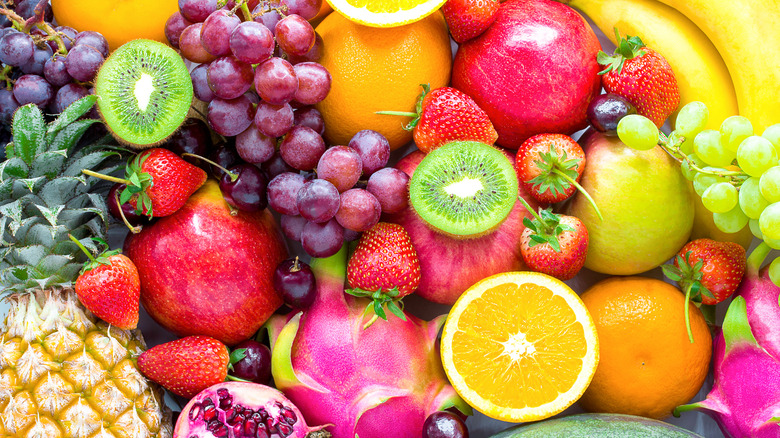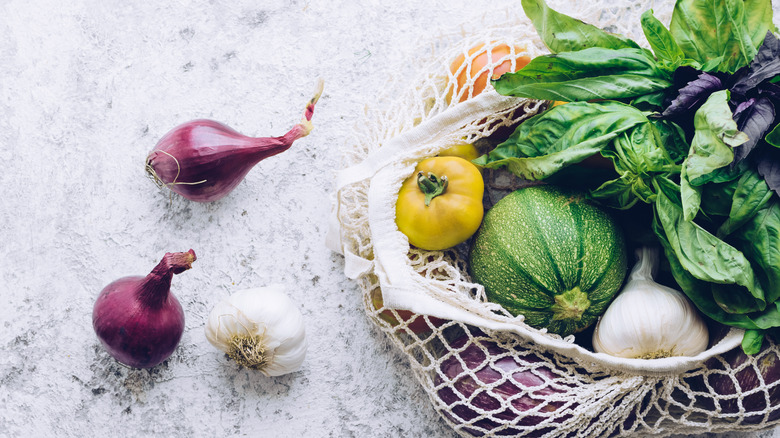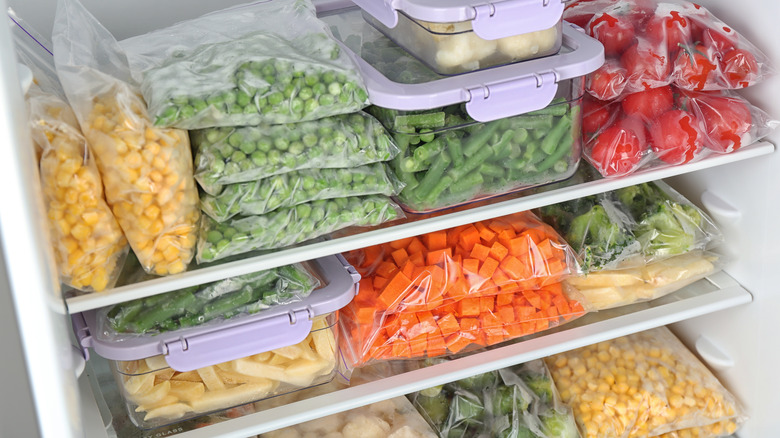How To Store Fruit The Right Way
Purchasing a bounty of fruits and vegetables is always an automatic mood booster. You now have a surplus of fresh produce, and ideas for how you'll utilize the food might be dancing through your head like sugar plums. But, alas, a day or two later, your once-prime produce is found to be limp and browning, and your hopes for a future of plant-based euphoria have been ruined. Although there are certain fruits and veggies that last longer than others, how do you prevent much of your produce from spoiling so quickly?
It should be noted up front that in many instances, slightly browned or spoiled-looking produce may still be fine to eat, especially if you can cut around the problem spots. Of course, if there is an odious stench lingering, be sure to throw it out.
There is a solution, however, that can extend the life of your produce – proper storage. Some swear by immediately washing the food upon getting home from the store, wrapping it in a paper towel, and then storing it in food storage bags in the fridge (per Martha Stewart). And while this is a good concept that can help prolong some forms of produce, it may not be enough.
The key to properly storing fresh fruits
As outlined by Fresh Fruit Portal, one way of securing and prolonging the freshness of fruit is to simply store the food in the same climate in which it was grown. Keep clear and consistent on what should be stored well, and we bet you'll be surprised at just how long your produce now lasts.
Jeff Brecht, professor of horticultural sciences in the UF Institute of Food and Agriculture Studies, spoke with Fresh Fruit Portal about the best tips for prolonging fresh produce, noting that "once a fruit or vegetable reaches its optimum eating quality, its cell begin to die, a stage we call senescence," which he links to the oft-feared moment in which you pick up a piece of produce and there's an ill-smelling, unappetizing liquid underneath. This is due to "the cells breaking down and releasing their liquid contents," which is what happens as the cells die and the produce begins to decay."
He clarifies that "the storage method should match the climate of the place where the fruit was grown" and mentions apples, which you've probably been storing wrong your whole life, and pears that should be stored "just above freezing," while warmer-weather crops such as mangoes and bananas should never be refrigerated. Brecht also explicitly notes that any ethylene-producing fruits or vegetables should be stored separately from other produce, since they tend to further the spoiling process.
Additional storage tips
Speaking with Fresh Fruit Portal, Brecht notes that when driving home from the grocery store, don't store your fresh produce in the trunk, instead, drive home with it in your passenger seat, giving the produce the same air conditioning privileges as your human passengers.
The truth is, you've probably been storing produce wrong your whole life, but that's no fault of yours. There wasn't a fruit and veggies storing class in school. The Kitchn suggests doing away with any errant water droplets or excessive moisture and drying your produce well before storing it.
If you've brought too much and don't think you'll be using the fruit before they spoil, make sure you don't make these mistakes when freezing the fresh produce. Respect the produce and it'll reward you with a longer-lasting shelf life, ensuring that you can make a myriad of wonderful dishes with your fresh fruits and not worry about the quandary of having to reluctantly dispose of expensive produce.


